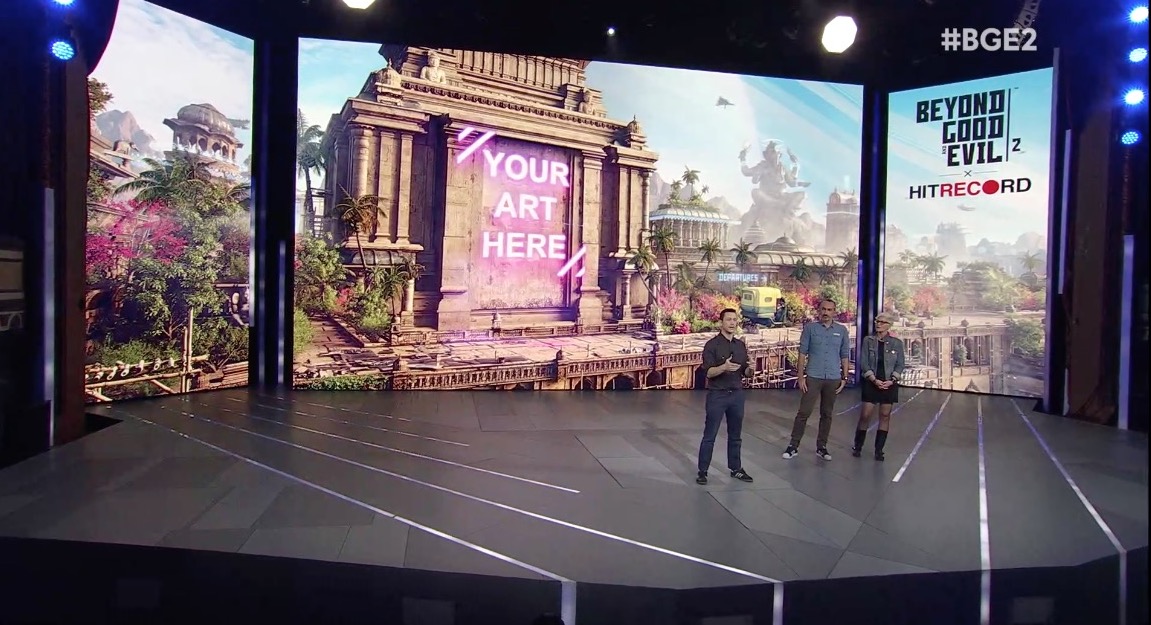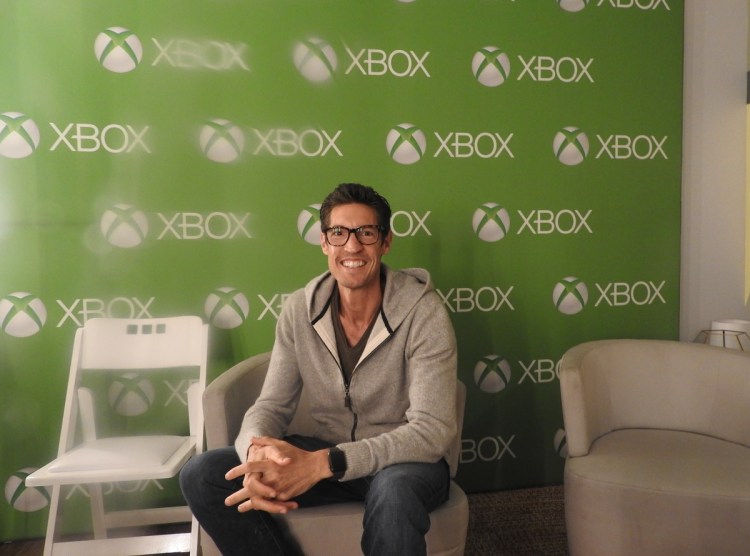
Above: Beyond Good & Evil 2
GamesBeat: I’ve heard that before from different parties here, like Ubisoft saying that they wanted to get community submissions of music or photos or artwork into Beyond Good and Evil II. I think other people are thinking about being more careful, too. EA might not have tripped up so much over the loot box thing had they been more communicative with the community.
The risk that’s out there may be as much as it’s ever been, that the Redditors can go into open revolt over something, whether it’s the way faces look in Mass Effect Andromeda or the fact that they don’t like loot boxes in Star Wars. You can trip up on something you didn’t realize was there. More open communication definitely makes a lot of sense, especially as we’re dealing with a very vocal community still.
Gallagher: Outside the release of a game, I think the development of a game is really interesting. When I say “think differently,” how we challenge expectations and break new ground, it’s not just in the types of games we make or what we intend to do in our ambitions. It’s how we make it. That’s an interesting conversational point. How do bring people in alongside? How open are we about the difficulties and the challenges we face day to day in development?
GamesBeat: I’ve seen different things people are trying. I’m a judge in this Universal contest. They teamed up with Unity and Microsoft and Intel for an indie game contest where the indies make a pitch based on Universal’s properties, like Jurassic Park, or lesser-known ones like Jaws or Turok. Things that haven’t had a game in a while. They said they could cook up an idea themselves and pick out a mid-size studio to make a brand-based mobile game or some other game, but they felt like there’s more creativity in the indie community to come up with things that might be more out of the blue.
So they’re having a contest to give $250,000 to the best pitch that comes in. It’s an interesting approach. Universal, on the one hand, has never done that. When you think about Hollywood companies, they’re more often in the news threatening to shut things down if they use their IP. This is more like, “We have all these things that haven’t been capitalized upon lately. Maybe we can find creativity to put behind them.”
Then there’s the whole user-generated content issue. That makes more sense to be very open with as well. I guess the only thing that gets sticky is if there’s confusion over who would own what. If you get too many ideas from outside–
Gallagher: To your point, even just feedback along the way is super valuable. How do you embrace a two-way dialogue of development? At what point is it the right time to embrace that dialogue? How deep and wide do you go? How public is it? These are all interesting development questions. Any time I start out on new projects, I like to challenge the assumption. Starting out these new ventures, I say, “How could we do it differently?” If you challenge yourself in that way on every level, challenge yourself to make something ground-breaking at the end, challenge how we make something ground-breaking, and not just what is ground-breaking, I think those are really interesting questions.
GamesBeat: I have a little vision that I’m not sure is crackpot, but I’ve been talking about it over the last year. It’s what I call the leisure economy. We went from a producer economy to a consumer economy and now we’re, what, a creator economy, I guess? The creators are people outside the traditional companies that are making a living doing something related to what traditional companies do.
User-generated content fits that pretty well. But you have esports athletes. They make a living playing games. How many people can get paid to play games? AI is going to eliminate a bunch of our jobs. What are we going to do with people in the future? If you pay them to play games, that’s that whole idea of, well, they bring value. If you have a free-to-play game, they engage with it. They make the game fun. Then a small percentage of people pay to finance the whole thing.
The idea of paying people to play games, I think, is interesting. There are more people doing it. We’re creating jobs that didn’t exist a short generation ago: streamers, cosplayers, YouTubers, esports people. The videographers working for the esports teams, they’re all getting paid as part of this new economy of many new jobs, and maybe a long tail of jobs that could exist. If you create games from the start thinking this is the future, you might create games differently.
Gallagher: Absolutely. The watchability, the esports components, the streaming of games, these games are all—again, when I look at the landscape of opportunities to go explore, there’s a ton of new space out there. This is sidebarring a little bit, but my dad was a finance guy. Wore a suit to work every day. Very accountant. We were well-looked-after. He raised a good family, all that stuff. But I said, “Hey, dad, I’m going to art college.” And then after art college I said, “I’m going to go make video games.” The look of horror – “Really, son?” – I can still remember it. He still says the same thing today.
The new equivalent could be what you’re saying. I can imagine kids coming out of college saying, “I’m going to be an esports athlete.” Telling their parents. It could be the equivalent of me 30 years ago telling that to my dad.

Above: Fortnite booth at E3 2018.
GamesBeat: I know a family who has a kid who’s 18. He’s really good at Fortnite, and they’re worried about him. What if he drops out of college to go play Fortnite? Well, what if he wins some of the $100 million they just put up for prize money? What is the correct parental advice?
Gallagher: I know! I have kids now, and I can imagine. What would my reaction be? “I’m going to go play Fortnite for a living!” It would be like my dad. “Well, son, that’s a good aspiration, but not a lot of people make money doing that. Know that you may end up not having a very nice life if you’re unsuccessful.”
GamesBeat: The imagination to go and create something that doesn’t exist–I’ve been getting paid to play games as a journalist for 22 years, out of the 30 years I’ve been a journalist. It is possible. But I think games can be crafted more for this new economy.
Intel even did a study about what they call the passenger economy that will arise from self-driving cars. People get two hours back in their days.
Gallagher: Imagine how much TV I could cram in that I don’t get to see. I miss so many shows!
GamesBeat: They say this will be $7 trillion economy in 20 years, the services going into cars, including games, that will take care of people.
Gallagher: Games, TV shows, all the things I don’t have time for because there’s too much to consume. It would be fantastic. I’d love it. But to your point, this is the opportunity. We have these new ways of playing and viewing and watching games and interacting with games. The landscape is changing. I think it’s a fantastic time, because that landscape is—the clay is still wet. We’ve got the opportunity to shape that clay in some way. As a creator, having the flexibility and the wet clay to go shape for the future is great.

